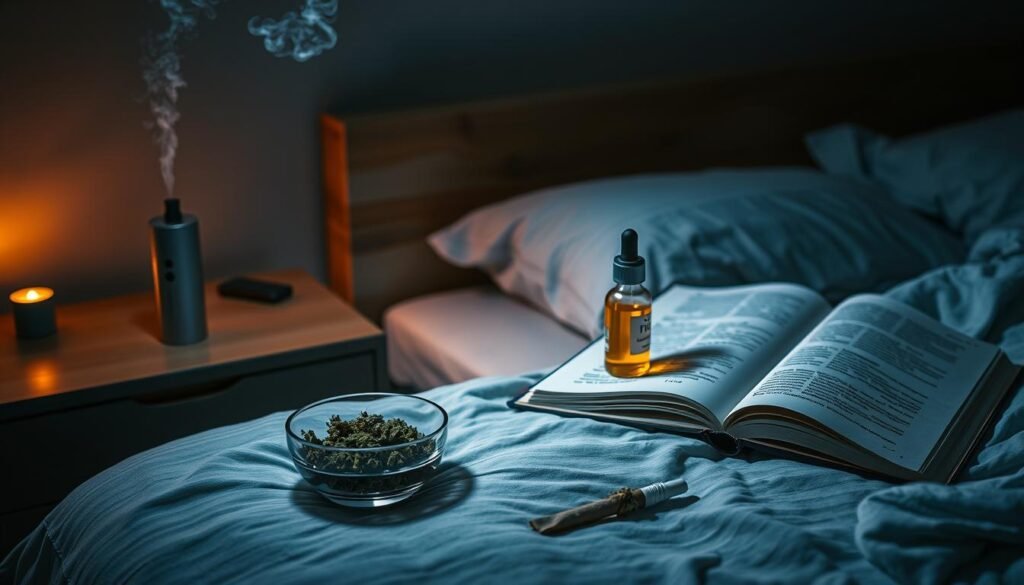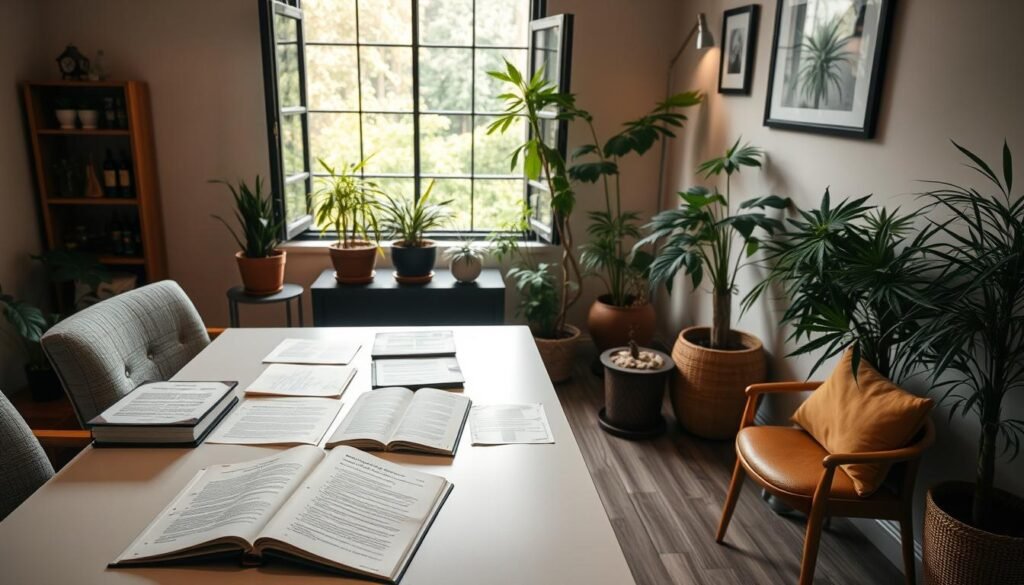About 70% of young adults using cannabis do so to help them sleep. This points to a trend where people look for ways to deal with insomnia. THC (tetrahydrocannabinol) is particularly interesting for its sleep benefits. With most medical cannabis users reporting better sleep, it’s important we look deeper into THC and insomnia.
Looking into cannabis for sleep needs a clear understanding of its effects. Things like how much you use, the cannabis type, and how you use it matter. Seeking advice from healthcare experts is vital for safe use. For those eyeing natural sleep solutions, checking out natural remedies may be worthwhile.
Key Takeaways
- About 70% of young adults use cannabis to assist with sleep.
- 85% of medical cannabis users report improved sleep quality.
- The relationship between THC and insomnia is complex and multi-dimensional.
- Consulting healthcare professionals can guide safe cannabis use.
- Different cannabis strains may affect sleep patterns variably.
Understanding Insomnia
Insomnia is a common sleep disorder that complicates the process of falling asleep, staying asleep, or waking up too early. People with insomnia often feel very tired during the day, are easily irritable, and struggle with thinking clearly. This condition is split into two types: acute and chronic insomnia. Acute occurs due to short-term stress or changes around you, while chronic lasts for a month or more and usually connects to other health problems.
Several elements can lead to insomnia, such as stress, underlying health issues, and how you live your life. Among these, chronic pain is especially tough, creating a vicious cycle that stops peaceful sleep. If you are in pain, it’s harder to relax, which in turn makes sleeping issues worse. This ongoing problem with pain and lack of sleep can harm both your mind and body. Hence, finding good ways to relax is key.
- Impact on mood: Feelings of anxiety and sadness often accompany insomnia.
- Cognitive functions can suffer: It can become hard to remember things or focus.
- Physical health risks: Not sleeping enough can lead to many health problems.
With nearly 30% of people sometimes facing insomnia, it’s vital to understand it well to solve it. Techniques for relaxing and changing certain habits can help improve sleep. These practices might be supported by certain treatments, like cannabis, which interacts with the body’s own system to aid sleep.
How THC Affects Sleep Quality
Research shows THC interacts with our endocannabinoid system. This system is crucial for many body processes. THC, a key compound in cannabis, typically has a calming effect, especially in low doses. This helps many people sleep better after using it at night. Studies have found THC can increase deep, non-REM sleep. This type of sleep is vital for repairing the body and processing memories.
However, how THC affects sleep can vary a lot from person to person. At higher doses, it might make you feel awake or anxious. This can interrupt your sleep cycle. THC also tends to lessen REM sleep which is important for thinking and emotions. This could change sleep quality over time.
A study found an interesting trend among medical cannabis users dealing with insomnia. About 39% were able to reduce or fully stop their sleep meds. Plus, 71% said their sleep got better. It’s key to have a doctor help manage cannabis use. This can help avoid bad effects and make treatment work better. More on this can be found in this study.
Knowing how different cannabinoids and cannabis strains affect sleep is important. This can help anyone looking to use THC for sleep. It’s about making smart choices for handling sleep issues.
THC and Insomnia: Exploring the Connection
The link between THC and insomnia is drawing lots of focus lately. This is especially true as medical marijuana becomes legal in many parts of the U.S. Studies show that THC affects brain receptors that control sleep. People with insomnia, PTSD, and chronic pain have found they can sleep better.
However, not all research agrees. Critics worry about the effects of using THC for a long time. They say it could make sleep quality worse in the long run. For conclusive results, we need more thorough studies. Though some benefit from THC in improving sleep, the results are mixed. About 21% report better sleep, while nearly half see no change or worsening conditions.
Those thinking about using THC for sleep should look at the big picture. Research into how THC works with our body’s sleep mechanisms is still ongoing. If you’re struggling with sleep issues, talking to a doctor is key. They can help you understand if medical marijuana is a good option for your situation.
Types of Cannabis Strains for Sleep
Many people are looking for natural ways to improve their sleep. They’re turning to cannabis strains for help. Research shows certain strains can really help with sleep, making people feel better. Picking the right strain is key to fighting insomnia.
Indica strains are major players for sleep because they are relaxing. They make deep relaxation possible, helping to get restful sleep. Granddaddy Purple and Bubba Kush are famous for their calming effects. They make the body relax and lessen anxiety, being ideal for nights when sleep won’t come.
Sativa strains are more about energy, which isn’t great for sleep. They wake you up instead of calming you down. For nighttime, hybrid strains are better. Hybrids mix indica and sativa, offering sleep benefits without keeping you awake.
Users often find certain strains specially bred for sleep work well for them.
| Cannabis Strain | Type | THC Percentage | Effects |
|---|---|---|---|
| Granddaddy Purple | Indica | 20% – 25% | Cerebral high, deeply relaxing |
| Bubba Kush | Indica | 18% – 22% | Relaxation, sweet taste |
| Girl Scout Cookies | Hybrid | 22% – 28% | Sedative, treats pain and anxiety |
| ChemDawg #4 | Hybrid | 20% – 26% | Potent, relaxing body high |
| Sugar Black Rose | Indica | 20% – 24% | Powerful sleep aid, calming |

Some users like Mochi, a hybrid that reduces stress. Others go for God’s Gift, offering peace and relaxation. These strains interact with the body’s system, helping with sleep.
Knowing the differences between strains helps users pick the best sleep aids. By choosing strains with THC, considering CBD, and looking at terpenes, people can find what works best for rest. This smart choice greatly improves sleep quality and health.
Benefits of THC for Sleep Disorders
THC offers exciting prospects for those with sleep disorders, especially for those dealing with anxiety or chronic pain. Digging deeper into THC’s benefits is key for anyone wanting new ways to tackle sleep problems.
Reducing Anxiety and Chronic Pain
THC can help ease reducing anxiety, making it easier to sleep. It soothes the mind, potentially leading to better sleep. Also, its ability to lessen chronic pain makes sleeping more comfortable. For many, cannabis products have been a game-changer for nighttime rest.
Enhancing Sleep Latency
THC may help you fall asleep quicker, a great help for insomnia sufferers. Although results vary, the promise of speeding up sleep onset is important. For more on this topic, visit here.
| Aspect | Benefits of THC |
|---|---|
| Reducing Anxiety | Helps calm the mind for better sleep |
| Alleviating Chronic Pain | Provides significant relief for a more comfortable night |
| Enhancing Sleep Latency | Shortens the time taken to fall asleep |
| Improving Sleep Outcomes | May lead to longer and higher quality sleep |
Potential Risks of Using THC for Insomnia
THC is often used to help with sleep. But it comes with risks people should think about. Its benefits might not last with regular use. This can make sleep problems even worse over time.
Long-term Sleep Quality Concerns
Daily use of cannabis, especially edibles, can lead to bad sleep quality. A study showed that people using cannabis every day had more trouble sleeping than non-users. A surprising 74% of users said they use cannabis to help them sleep. This highlights worries about becoming too dependent on it for good sleep.
Impact on REM Sleep
THC affects REM sleep, which is key for a good mood and remembering things. Using THC regularly can cut down the time spent in this important sleep stage. This can harm your emotional and mental health. We must not ignore the risks THC poses to REM sleep as its use for better sleep grows.
| Study Findings | Impact on Sleep Quality |
|---|---|
| Daily cannabis users | Increased insomnia symptoms, worse subjective sleep quality |
| Increased edible use | Worse sleep efficiency, lower sleep duration |
| Reduced REM sleep | Potential negative effects on mood and memory |
| Use of cannabis for sleep | 74% of recreational users reported using cannabis for sleep |
| Long-term general trends | Reliance on cannabis for sleep may lead to dependency issues |
Dosage Considerations When Using THC
Finding the right thc dosage is key for better sleep through cannabis. Different people react differently to THC. It’s smart to start with small amounts. This approach helps avoid side effects and lets users learn how THC affects them.
Starting with Low Doses
Starting with 10-15mg of THC might be best for many. It can bring the calm needed for sleep. If that’s not enough, slowly increasing the dose may work better. A study in 2017 found that cannabis could be used instead of other sleep aids. It’s important to see how different amounts affect you, especially close to bedtime.
Understanding Individual Responses
People react differently to cannabis. For some, a little bit helps them sleep better. Yet, for others, more might make them anxious. A study from July 2, 2021, showed many cannabis users sleep better. As more people try different amounts, we learn what works best. For safe use, there’s helpful guidance on medical cannabis dosing.
| Dosage Range (mg) | Typical Effects | Recommended Time of Use |
|---|---|---|
| Low (10-15) | Sedative effects, less anxiety | 1-2 hours before bedtime |
| Medium (15-30) | Improved sleep quality, possible drowsiness the next day | 30 mins before sleep |
| High (30+) | Increased risk of anxiety, potential for longer sleep duration | Close to bedtime |
Methods of Consuming THC for Sleep
Choosing the right THC consumption method is key for better sleep. Each has its own timing and effects. They match different needs and preferences.
Smoking is a favorite for its quick effect, usually within minutes. It gives fast relief from insomnia, making you relaxed and sleepy quickly. But, smoking is not great for your lungs over time.
Edibles offer a longer-lasting sleep benefit. You’ll need to wait 30 minutes to two hours to feel the effect, as your body needs to digest them. But, they help you stay asleep longer once they kick in.
Tinctures are flexible and absorb quickly. Dropping them under your tongue means they work in 15 to 45 minutes. It’s easy to control how much you take, so it’s good for personalized needs.
| Method | Onset Time | Duration of Effect | Considerations |
|---|---|---|---|
| Smoking | Within minutes | 1-3 hours | Immediate relief but potential lung health risks. |
| Edibles | 30 minutes – 2 hours | 4-8 hours | Long-lasting effects but delayed onset. |
| Tinctures | 15-45 minutes | 2-6 hours | Easy dosage adjustment; sublingual absorption. |
Choosing the right THC method depends on your lifestyle and sleep needs. Knowing how each works helps you get better sleep quality.

Alternatives to THC: Other Natural Remedies
Looking into alternatives to THC can help those battling insomnia find effective, natural recourse. Among these, CBD is particularly notable as a sleep aid. Its ability to improve sleep without inducing a high makes it appealing.
Exploring CBD as a Sleep Aid
Studies show CBD could improve sleep quality. Many say it helps them fall and stay asleep. It’s viewed as a solid alternative for those wary of THC. CBD’s calming effect is key to its success in promoting better sleep.
Natural remedies like melatonin supplements and valerian root are also explored for sleep improvement. Melatonin, used in doses from 3–10 mg, can enhance sleep quality. Valerian root, in 300–600 mg doses, may benefit sleep, though findings vary.
Other Relaxation Techniques
Adding relaxation techniques can boost the effects of natural remedies. Practices like meditation and deep breathing help relax the mind and improve sleep. Lavender aromatherapy is another tool that helps improve sleep and ease anxiety.
Mixing magnesium, melatonin, and vitamin B has shown positive outcomes for insomnia. Passionflower extract specifically has helped increase sleep time and efficiency. For more details on these strategies, you can click here to learn more.
Consulting Healthcare Professionals about THC Use
Before starting any THC routine for better sleep, talking to healthcare professionals is key. They offer advice that matches your health needs. This makes using cannabis safer and more effective, especially with the complex nature of insomnia.
Healthcare experts look at how THC might react with your current medicines. They account for legal issues in various states too. This leads to personalized treatment that helps beat sleeplessness.
Certain cannabis strains, like indica, can really help with insomnia. Experts know which types work best, based on what you’ve experienced before. This knowledge is crucial for choosing the right approach.
For those thinking about THC for sleep, begin with a chat with a healthcare expert. This conversation helps make smart choices about cannabis use. To learn more about fighting insomnia, talking to professionals is an important step for better sleep.

Conclusion
Looking into how THC impacts insomnia shows both hope and concerns for people with sleep issues. Studies suggest cannabis might help some people sleep better. But, how it affects sleep quality and symptoms varies from person to person. This highlights the complexity of using THC for sleep.
Research shows that using cannabis early in life might lead to more insomnia as an adult. This means young people should be careful. Even though THC can lessen sleep problems, it’s important to consider the risks. Long-term use could change sleep habits.
It’s crucial to talk with a healthcare provider before trying THC for sleep. They can offer advice based on your health and needs. As people look for natural ways to sleep better, knowing the pros and cons of THC is important. It helps them make decisions for their health and happiness.